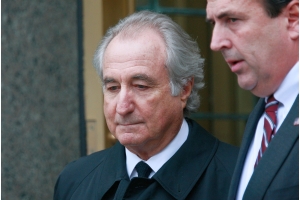The scandal surrounding Bernard Madoff and his $60 billion Ponzi scheme is back in the news with the tragic death last week of Mark Madoff, the eldest son of the fraudster. He committed suicide by hanging himself in his New York apartment after sending several tortured emails complaining that no-one believed him.
Madoff senior is in Butner Prison of course, serving a 150-year life sentence, and according to New York Magazine earlier this year is treated like a celebrity, “even if his admirers were now murderers and sex offenders.” Apparently his ego remains pretty much in tact and now free from hiding his crimes, admits to defrauding billions.
In the past fortnight, the court-appointed Madoff trustee, Irving Picard, was unusually busy, filing last-minute law suits against a raft of big banks, advisors and family members. The two-year statute of limitations for such suits passed last Saturday. It was now or never. So Picard launched a plethora of actions, including one against HSBC for $9 billion in damages. Picard’s claim is that HSBC ignored the obvious (statements with wrong details, wrong names for funds, transactions settled on non-working days) red flags that should have told them something was wrong. The fees they received from Madoff and the feeder funds were “kickbacks ensuring they looked the other way.” HSBC says it will defend the lawsuit vigorously.
Other banks such as Citibank and JPMorgan Chase are also being sued pretty much along the same lines. All-in-all Picard is suing to receive up to $20 billion from several financial institutions, all of whom deny any wrongdoing.
Some banks have already decided to settle. Union Bancaire Privee, the private Swiss bank was sued for $1 billion and last week settled for $500 million; money that will go back into the funds for compensating victims.
On the personal front, the Madoff sons have also been targeted by the authorities trying to discover what role, if any, they played in their father’s fraud. The brothers have always maintained that because they worked on the trading desk at the legitimate side of the company they knew nothing about the fraud taking place on the rogue investment services side. The critics say it stretches common sense beyond breaking point to believe they couldn’t have smelled a rat.
After two years of investigation, 46-year-old Mark Madoff, who was also named in the lawsuits himself, hanged himself in his New York apartment. He allegedly sent a raft of emails before hanging himself, one of which was said to be to his attorney, saying “no one wants to know the truth.”
I have followed the Madoff case with interest since his arrest just before Christmas two years ago. The case had it all – dishonesty by a major, respected, Wall Street player on a level never seen before; thousands of investors who lost everything; the greed of bankers and advisors who seemingly ignored the obvious; staggering incompetence from the regulators and supervisors at the SEC amongst others. Never mind asking the right questions, some never asked any at all.
Bernard Madoff always claimed that his massive fraud started when he did a few false trades to tide him over a bad time. He could not have known that decades later he would be facing the rest of his life in prison, his name would become a synonym for criminality on a grand scale, his wife would be a broken pariah and his son would be dead. A high price indeed paid by everyone.
– End –
Richard Quest is a CNN correspondent based in London, host of the weekday one-hour program “Quest Means Business”. For program highlights and more, go to www.cnn.com/qmb

